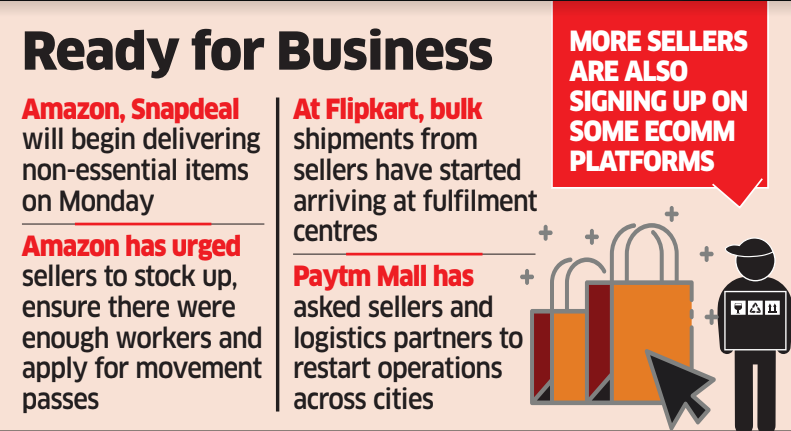
Ecommerce firms will accept online orders for ‘non-essential’ items starting this weekend, as they gear up to restart operations fully from Monday in line with a central government order issued on April 15.
Sale of products deemed non-essential — including smartphones, personal computers, electronics items, apparel, furniture and home décor — form 90% of the gross merchandise value (GMV) for large online marketplaces.
GMV is an industry term indicating the total value of sales in a given time frame.
With the sector opened up, ET reported on April 16, most etailers would start delivering all products from April 20, although Amazon India had sought greater clarity on the guidelines from the government.
The US ecommerce giant, however, said in a statement on Friday, “In line with the recent guidelines by the government and effective April 20, we will serve customers, in addition to daily essentials, with products they need the most and which they have not been able to access because of the nationwide lockdown….”
The online retailer also urged sellers via email to stock up, ensure there were enough workers to meet demand and apply for movement passes to restart quickly. ET has reviewed a copy of the email.
As ecommerce firms get ready to open up completely, more sellers are also signing up on some of these platforms, anticipating recovery in offline demand to take longer in view of the nationwide lockdown being extended to May 3.
At rival Walmart-owned Flipkart, an executive told ET on condition of anonymity that bulk shipments from sellers had started arriving at its fulfilment centres and that orders will be shipped to consumers by Monday.
The company “should open up orders for non-essentials in other states as early as Friday evening. We’ll put the notification on the app for users to see,” the person added.

Snapdeal, which continued to accept orders for non-essential items promising delivery once the lockdown ended, told sellers on its platform to ready orders for shipment starting Monday. “Snapdeal is in the process of trimming delivery timelines to align with faster deliveries expected from next week onwards. These will get dynamically adjusted as per flow of goods and operating conditions in various regions,” a Snapdeal spokesperson said.
Paytm Mall is also building on its essential products portfolio to sell items in the non-essential consumer electronics and fashion categories. It has also asked sellers and logistics partners to restart operations across cities, said Srinivas Mothey, senior vice president of Paytm Mall, adding that a standard operating procedure and concessions have been put in place so that sellers can operate businesses safely.
Other specialised or vertical ecommerce companies, too, are preparing to ship products from Monday.
“The biggest priority for us right now is the safety of the entire supply chain as we gear up for a ‘back-to-business’ from April 20,” fashion portal Myntra said in a statement.
Spike in Seller Signups
Separately, there has been a spike in the number of signups and queries from new sellers, some online retailers told ET.
“We now have 6 lakh sellers on our marketplace, up from 5.5 lakh in mid-Jan. The new seller registration run rate continues to be robust, with thousands of new sellers registering on our marketplace three weeks into the lockdown,” said an Amazon spokesperson.
Snapdeal also said it had deployed teams to assist new sellers in signing up, with large business centres such as Ludhiana, Surat and Salem seeing an increased number of such signups.
“We are indeed seeing a spike in the number of seller queries with regard to the resumption of business and also new registrations,” said Rajnish Wahi, senior vice president – corporate affairs and communications at Snapdeal. Walmart-owned Flipkart declined to comment.
A source in the company, however, said it was still too early to determine if there had been an increase in new seller signups.
Industry experts also said this could be a stop-gap arrangement to kickstart businesses immediately.
“The fact is that small businesses are really cash-strapped and if they have to pay salaries to their employees, then they need to earn money,” said Devangshu Dutta, chief executive of retail consulting firm Third Eyesight.
Small businesses with inventories will find ecommerce a good way to reach customers, he added.
Leave a Reply